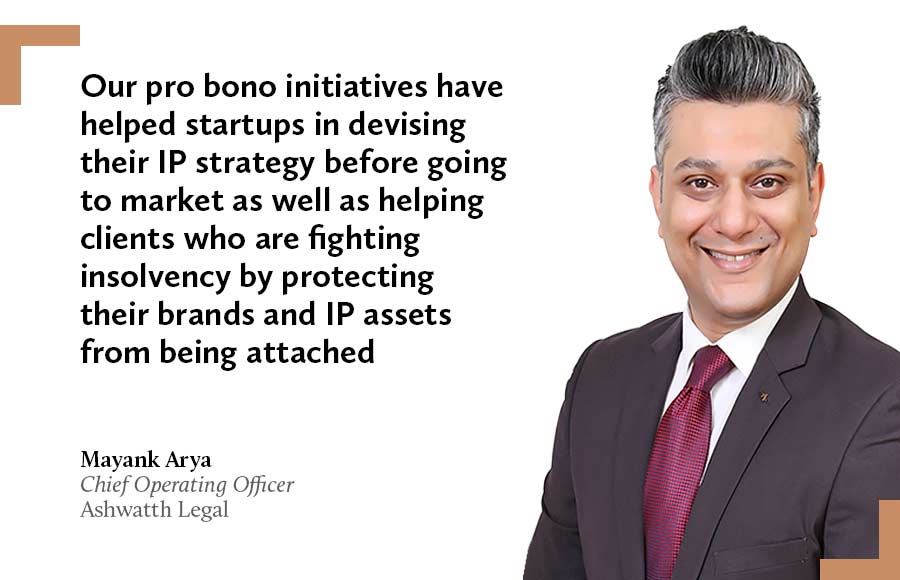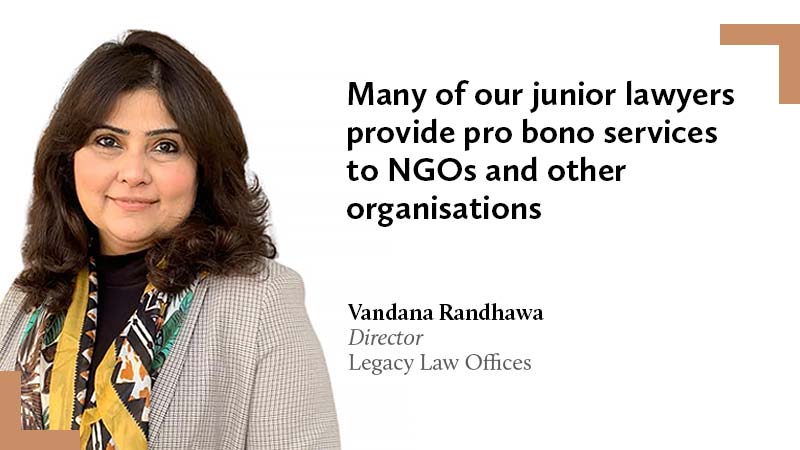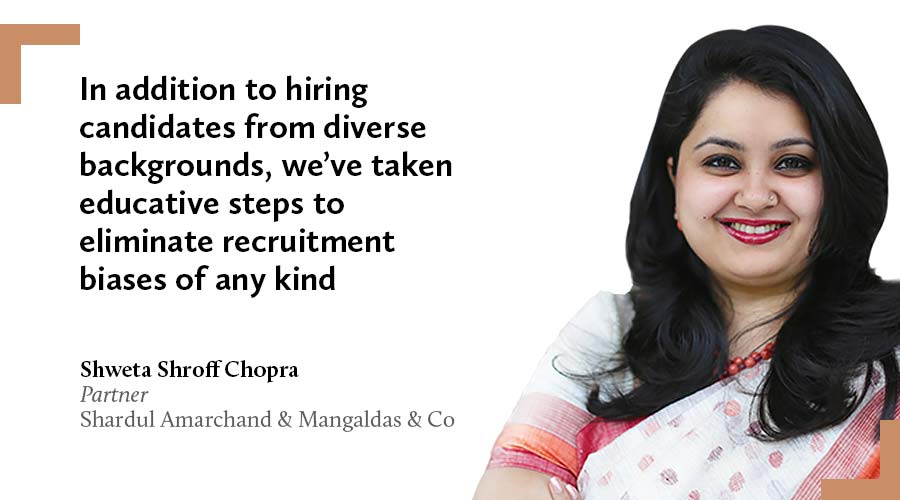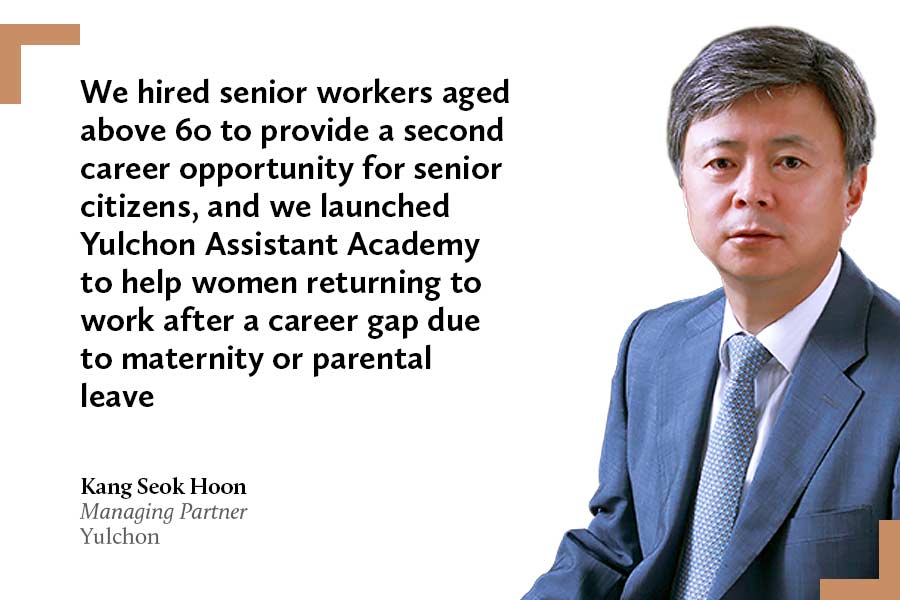Law firms across Asia are putting profits aside to focus on pro bono work, community engagement, sustainability and staff welfare. Vandana Chatlani reports
Law firms have long recognised the importance of promoting access to justice and forging a culture that values and takes social responsibility seriously. Mastering legal concepts and building business acumen form an important part of a law firm’s offerings and success. However, providing meaningful opportunities and a solid growth plan for staff, promoting diversity and inclusion, and supporting the community go a long way towards recognition, reputation and employee retention.
Many practices already adopt pro bono policies and dedicate resources to pro bono work, while others leave the decision to individual lawyers. Several now consider pro bono activities alongside billable work, rainmaking and other parameters when assessing new candidates and deciding on bonuses and promotions. Many have realised that such incentives are necessary to promote these practices in a long-term, thoughtful and sustainable way.
“We help address systemic inequalities, and support access to justice for all with our pro bono initiatives,” says Mayank Arya, the chief operating officer at Ashwathh Legal in New Delhi. “Our pro bono initiatives have helped startups in devising their IP strategy before going to market as well as helping clients who are fighting insolvency by protecting their brands and IP assets from being attached.”

The firm has an equal gender representation (four females, four males) among fee earners. It promotes religious diversity and provides opportunities to individuals from diverse backgrounds.
“Many of our junior lawyers provide pro bono services to NGOs and other organisations,” says Vandana Randhawa, director at Legacy Law Offices in Chandigarh. “Lawyers and other non-lawyer staff of the firm, irrespective of their position, are encouraged to execute their responsibilities towards the community differently as may be suitable to them.”
In the past few weeks, our sister publication Asia Business Law Journal invited law firms across Asia to tell us about the policies, philosophies and initiatives of which they are most proud. We are thrilled to have received hundreds of submissions from international, regional and local law firms eager to share with us their initiatives. Unfortunately, due to space constraints, we can only highlight a limited number of these entries.

This report offers a snapshot of the philanthropic endeavours, pro bono activities, climate action and good governance that is in healthy blossom around the region.
Diversity and inclusion
Many legal firms have looked seriously into their diversity and inclusion (D&I) charters in a bid to showcase their commitment to equal opportunities, and celebrate differences.
However, there is no single approach to tackling homogeneity at a law firm, especially in Asia, where the problems of sameness, unfair practices and discrimination vary substantially. Law firms in the region share some of the same challenges as their counterparts in the West, but there are also unique issues such as caste, tribal affinity, socioeconomic realities and societal structures that can inform which communities are able to get a seat at the table and climb the social and working ranks.

“In addition to hiring candidates from diverse backgrounds, we’ve taken educative steps to eliminate recruitment biases of any kind,” says Shweta Shroff Chopra, partner at Shardul Amarchand Mangaldas & Co in New Delhi. “We’ve hired a few visually impaired candidates and provide internship opportunities to the economically weaker section and the LGBTQ community. Also, we’ve taken steps to build work infrastructure to enable them to do assigned roles. Usage of gender-neutral pronouns and language is another step we’ve taken to emphasise our philosophy.”
In a bid to promote greater diversity in the legal profession, Morrison Foerster in Hong Kong has launched a new diversity internship programme for first and second-year LLB students in the city identifying as ethnic minorities. Successful applicants will spend four weeks at the firm’s Hong Kong office, gaining professional experience through work assignments and projects that will better position them for employment.
Park Joong Won, an attorney at Kim & Chang in Seoul, says that while his firm strongly supports gender and cultural diversity, “due to the unique situation in Korea, where over 90% of the country’s residents are ethnic Koreans, diversity at our firm is primarily focused on gender”. The firm retains more than 320 female lawyers, 26% of the total, and Park says this is the highest number among Korean law firms.

Yulchon, in Seoul, has found interesting ways to improve diversity and equality. “We created new roles such as workplace care and sanitisation, along with document delivery, to provide roles for persons with disabilities,” says managing partner Kang Seok Hoon. “We hired senior workers aged above 60 to provide a second career opportunity for senior citizens and we launched Yulchon Assistant Academy to help women returning to work after a career gap due to maternity or parental leave.”
Raymond Mah, managing partner at MahWengKwai & Associates in Kuala Lumpur, says his firm makes every effort to recruit a diverse pool of employees from differing races, religions and genders.
“Firmwide, our team members come from varied backgrounds and heritages including Chinese, Malay, Indian, Bidayuhs and Iban,” says Mah. “The number of different languages spoken – English, Malay, Mandarin, Tamil, Cantonese, Hindi, Hokkien, Hakka and Punjabi – by our staff is a testament to the rich diversity at the firm’s workplace.”
Experts also flag the importance of considering intersectionality and the manner in which multiple diversities can impact personal experience. The reality of a woman who is neurodivergent, from a lower socioeconomic background and a lower caste, in a country like India for example, would be vastly different from that of a woman who is neurotypical with an upper caste background and a higher financial status.
Although not by design, 80% of partners and 50% of lawyers at Indian law firm Samvad Partners are women. The firm is proud of these numbers and says they have helped in the design of more flexible and friendly policies and initiatives that support women and men in balancing work and their personal lives.
Samvad has also supported and sponsored law schools in their programmes and initiatives on diversity and inclusion, encouraging dialogue on the rule of law and issues of marginalised communities, gender diversity and an inclusive society. In addition, it has organised mentoring sessions with young women at the bar at the High Court of Karnataka.
Work-life balance
The intensity of legal work is often compounded by the pressure of tight deadlines and long hours. Lawyers, especially those in junior positions, have often complained that they are overworked and underpaid; while those in more senior roles have expressed dissatisfaction when faced with glass ceilings and a lack of leadership opportunities despite loyalty and hard work.
The covid-19 pandemic provided space – both physical and mental – and food for thought as lawyers adjusted to new working patterns from home. Emboldened, they considered whether it was time for a change. This quest for balance and a reassessment of priorities that truly matter has led numerous firms to continue offering flexible working options.
Trilegal periodically conducts mental health workshops for lawyers and staff and organises interactive sessions with leading performance coaches. These sessions aim to reduce the stigma associated with mental health issues and give employees a chance to share their experiences. They also have a flexible work arrangement.
Januar Jahja & Partners in Jakarta maintained a majority work-from-home schedule for its employees long after pandemic restrictions were lifted. Part of the reason for this was Jakarta’s notoriously bad traffic. “We found that not only did our employees maintain their levels of productivity and responsiveness while working from home, their efficiency and commitment actually increased as it gave many of them an extra two or three-plus hours back each day by eliminating their commute,” says Andrew Diamond, a foreign IP consultant at the firm.
Weerawong C&P in Bangkok grants its lawyers a unique degree of flexibility and autonomy that could no doubt appeal to many lawyers, especially millennials. “We promote a work-life balance among our lawyers through our flagship ‘Be Your Own CEO’ programme, which is based on the understanding that the definition of hard work and a balanced life is different for each person,” says practice group consultant Jennifer Sloan. “All lawyers are encouraged to define their goals, choose their annual hours and adopt their work and routine accordingly to create a ‘well-designed life’.”
![]()
Icon Law in Singapore espouses a similar philosophy, with no rigid office days. “Members of the Icon family are given absolute flexibility to choose when they come into the office, although 60% of the working week is recommended, particularly for juniors,” says director Jeremiah Huang.
“You will see our guys float in and out of office at their will – whether because an overfed pet has diarrhoea and must be brought to the vet, or just because it is a rainy day and working from home is more pleasant than being in the office’s air-conditioning. The 60% recommendation comes from a place of the purest of intentions – engagement, and thus bonding, still requires a human touch.”
While the freedom to design their workdays is appealing, it doesn’t erase lawyers’ concerns of burnout and the fear of office work impeding on personal time. Law firms also have to raise their game when it comes to addressing mental health concerns, given that workplace stress can commonly lead to burnout, anxiety and addictive behaviour.
In the past 12 months, Simmons & Simmons in Singapore has held online sessions focused on burnout and the importance of sleep and nutrition, led by the Singapore Mental Health Association. “These webinars proved very popular with our teams across Asia and have reinforced the importance of prioritising wellness,” says partner Mohammed Reza.
King Stubb & Kasiva in Bengaluru dedicates one hour each week to promote mental well-being through its Weekly Mental Wellness Hour. During that hour, the firm raises awareness about issues related to mental health and engages in activities that promote inclusivity and diversity, with contributions from all team members.
A healthy work-life balance also often involves negotiations around parental leave. Many firms have revisited their leave policies, making entitlements more generous with the realisation that if employees feel cared for, they are more likely to stay.
This year, Mourant launched a series of updates to its policies for all employees regardless of role, location or length of service. The firm offers 24 weeks paid maternity leave with the option to take up to 52 weeks, and six weeks paid parental leave with the option to take up to 52 weeks for the partner or spouse of the child’s mother, primary parent or sole adopter, fathers and secondary parents in surrogacy or adoption.
Ashurst revised its global parental leave provisions in 2021 to strengthen support for working parents and encourage a more diverse and inclusive working environment. Among other rights, the firm’s policy offers 26 weeks of full paid leave irrespective of gender identity, and includes pregnancy loss provisions comprising two weeks paid leave for anyone who suffers a pregnancy loss, their partner or their surrogate mother, plus an additional five days for related appointments.
Climate consciousness
Experts have consistently highlighted the role that lawyers must play in educating and supporting clients on their environmental and social governance (ESG) records and climate goals. Companies, governments and NGOs are increasingly seeking legal advice on how to lower emissions, reduce environmental risks and accelerate energy transition goals to make decarbonisation a reality.
Dechert, for example, recently advised Clime Capital Management, a Singapore-headquartered fund management company, on the launch of a first-of-its-kind philanthropic funding initiative for the Southeast Asia Clean Energy Facility. The project has ambitions of raising USD2.5 billion in private investment for clean energy projects in Southeast Asia, with an initial focus on Vietnam, Indonesia and the Philippines, to accelerate the low-carbon transition in the region.
Sarmiento Loriega Law (SL Law) in Manila was involved in assisting a Philippine environmental civic group to stop illegal reclamation activities that cause significant environmental destruction in Coron, Palawan, home to UNESCO World Heritage sites and considered the country’s last ecological frontier.
“SL Law worked with the former president of the Philippines and key members of his cabinet to address the extensive environmental damage,” says Maria Elizabeth Peralta-Loriega, the firm’s founding and co-managing partner. “The most significant accomplishment is the recent forfeiture by the Philippine Reclamation Authority of all illegally reclaimed lands in Coron, which to date is one of the biggest forfeitures of illegally reclaimed lands in favour of the state, and the only massive forfeiture of lands under the [former] Duterte administration.”
While law firms have spruced up their ESG teams, investing in talent and resources to compete for companies in search of the best environmental advisers, they are also reflecting on ways to reduce their own carbon footprint.
DLA Piper has a comprehensive plan to decarbonise its business, focusing on transformations in five areas, including: implementing its “Thoughtful Travel” campaign to reduce emissions by 75% by 2030; working with suppliers to reduce emissions on its supply chain by 25% by 2030; switching to renewable electricity across all offices by 2030; optimising energy use in its offices; and designing future workspaces with sustainability and health in mind.
Watson Farley & Williams (WFW) has taken a similar approach in monitoring its energy consumption patterns. Office managers in Singapore, Bangkok, Hong Kong and Hanoi are helping deliver the firm’s global decarbonisation project. WFW has publicly committed to the Science Based Targets initiative and is in the process of completing external verification to map its global carbon footprint so it can set specific targets in 2023, supported by a refreshed carbon management plan covering its global operations.
Trilegal also advises non-profit The Ocean Cleanup on legal structures, regulations, and public-private partnerships for environmental projects in India. The firm supports the organisation in liaising with state governments and implementing initiatives under the government’s green agenda. Trilegal’s climate change practice also contributes pro bono work for environmental preservation.
Other firms have adopted green initiatives that include becoming paper-light, ending the purchase of any form of single-use plastic, introducing measures to reuse existing plastic products, and conducting energy audits to reduce energy waste.
Community service
Law firms are throwing themselves passionately into community service, engaging in social activities, fundraising, outreach programmes and working with underserved communities. Several have contributed towards making people with disabilities visible and valued members of society, while others have sought to address the welfare of the elderly.
Taiwan is set to become a “super-aged society” in 2026, when more than 21% of its population will be 65 or older. With this in mind, Formosa International in Taipei compiled and organised three years of legal research addressing topics such as medical issues, long-term elderly care, employment and estate planning. The research was published in a book targeted at equipping the public for the challenges to come with a concept called advance total planning, which helps people think about multiple aspects of ageing including planning for health, care, finances and a good life.
Law firms are also doing their part in tirelessly working to advance the rule of law. Since 2021, partner Mike Lu and junior associate Lily Huang, at Lexcel Partners in Taipei, have advocated for an amendment to the Civil Code to suspend or prolong the statute of limitations in favour of minors who are victims of sexual abuse or child violence. This is to give minors the option to decide, once they reach adulthood, whether to make a claim against the defendants. The draft amendment has been endorsed by 21 lawmakers and was submitted for the first reading at the Legislative Yuan in 2022. “We hope that thousands of victims will benefit from the passage of the amendment to the Civil Code to gain justice,” says Lu.
In Indonesia, Tony Budidjaja, founder and senior partner of Budidjaja International Lawyers, established the Indonesian Academy of Independent Mediators and Arbitrators (MedArbId), a non-profit member-based Indonesian centre that aims to promote and grow alternative dispute resolution (ADR). “MedArbId is devoted to encouraging the use of ADR mechanisms by increasing awareness and developing the vocation across the Indonesian archipelago and its neighbours by providing affordable and accessible education and training,” he says. Ambitions to build a culture of giving back have led to the institutionalisation of pro bono work across law firms.
In 2022, 89% of Bae Kim & Lee’s attorneys in South Korea participating in a pro bono challenge exceeded their targets, clocking up 21,601 hours in free legal advice. “These efforts led to significant court decisions, including the ruling that recognised the state’s liability for damages suffered by refugee applicants who were denied refugee status due to poorly arranged interviews, and the Supreme Court’s ruling that recognised the mobility rights of persons with disabilities and the need for effective remedies against discrimination,” says managing partner Sky Yang.
Other prominent Korean law firms such as Shin & Kim and Lee & Ko have established special departments to help marginalised populations. These involve pro bono work for North Korean defectors, children and adolescents, public interest organisations and socially disadvantaged people.
Much pro bono work has also been devoted to combating violence against women. Stefanie Yuen Thio, joint managing partner at TSMP Law in Singapore, helped launch SG Her Empowerment (SHE) in 2022.
“SHE is the result of the work we’ve done on women mentorship as a firm,” says Thio. “It is an independent not-for-profit organisation that helps tackle online harm against women and girls.” SHE works in collaboration with the Singapore Council of Women’s Organisations (SCWO). “Our lawyers assist by providing pro bono legal aid at the SHECares@SCWO clinic.”
Similarly, Romulo in Manila has become the Philippine member law firm of the UN International Convention on Missing and Exploited Children (ICMEC). “We assist ICMEC in documenting and resolving child abuse, child pornography and white slavery cases, and recommending prosecution to our Philippine Department of Justice’s anti-child kidnapping and abuse centre,” says senior partner Perry Pe. “We also assist ICMEC in documenting money laundering cases after we follow the money trail involved in the above cases.”
Oentoeng Suria & Partners, in association with Ashurst in Jakarta, offers legal support to Sumba Hospitality Foundation, a non-profit operating a hotel school and transformative eco-resort on Sumba Island, on a wide range of matters such as employment contracts, permits and licences, immigration law, partnerships with hotels and donors, and the general governance of the foundation.























